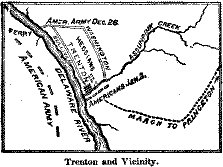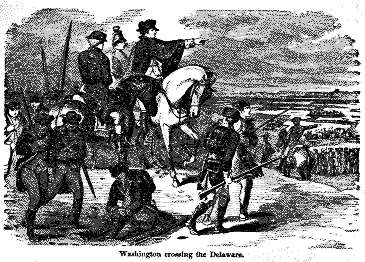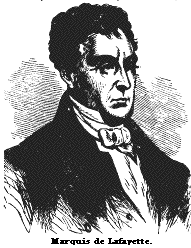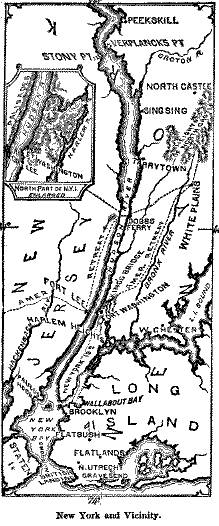Resource Center OLLibrary
|
120 |
|
|
|
|
121 |
5. After this defeat,
Washington withdrew the remainder of the troops from Long Island,
under cover of night and a dense fog, to New York, and soon after
evacuated the city, and retired to Harlem
Heights,1 where he threw up
fortifications.2 The British landed on the eastern
shore of New York Island,3 September 15. The American
commander, perceiving that the enemy designed to gain the rear of
his camp, left a force of about three thousand men to defend Fort
Washington, and abandoned the rest of the island. On the 28th of
October he met the English at White Plains, where an
indecisive engagement ensued. Washington, however, thought it
prudent to fall back to the heights of North Castle. He soon
discovered that the British intended to enter New Jersey; and,
having left about four thousand troops at North Castle, under
General Lee, and a force under General Heath, at Peekskill, to
guard the Highlands of the Hudson, he crossed over into New
Jersey with the main body of his army.
6. On the 16th of
November, Fort Washington, after a spirited defence, was
compelled to surrender to a large force of the enemy; and, four
days afterwards, Lord Cornwallis having landed on the west bank of
the Hudson, with six thousand British troops, Fort Lee was
evacuated, the garrison joining Washington, who retreated to
Newark. The retreat was continued through New Jersey
from Newark to Brunswick, from Brunswick to Princeton, from
Princeton to Trenton, and from Trenton to the Pennsylvania side of
the Delaware.
The pursuit was urged with so much rapidity that
the rear of the American army, while engaged in demolishing the
bridges just crossed, was often within sight and shot of the van
of the enemy, employed in building them up. This retreat was made
under circumstances of the deepest depression and gloom.
Washington's army was pursued by an insolent foe. The provincials,
driven from Canada,4 had been obliged to
1 In the northern part of New York, or Manhattan Island.
2 About the time that Washington took post at Harlem, it was deemed important to ascertain the state of the British army on Long Island. For this purpose Captain Nathan Hale, a young officer of liberal education and accomplished manners, volunteered his services. He entered the British army in disguise, and obtained the information desired; but while returning he was apprehended, and ordered for execution the next morning. He was not allowed a Bible, nor the attendance of a minister. His last words were, "I only regret that I have but one life to loose for my country."
3 Near the present Thirty-sixth Street. 4 See p. 117, ¶ 14.
QUESTIONS. -- 5. What did Washington next do? Where did the British land? What did Washington perceive? What steps did he take in consequence? What happened October 28? To what place did Washington fall back? What was his next course, and for what reason? 6. What of Fort Washington? Of Fort Lee? Of the retreat through New Jersey? What is said of the pursuit?
11
|
122 |
|
give up Crown Point,1 and had
lost the control of Lake Champlain. Nor did tidings from
New England bring any encouragement. The same day (December 8)
that Washington retreated across the Delaware, Sir Peter
Parker,2 with a British squadron, took possession of
Newport, then the second town in New England. The little
provincial fleet that was stationed in Narragansett Bay, under
Commodore Hopkins,3 took shelter in Providence
River.
7. Disheartened at recent losses,
numbers of the militia were daily claiming to be discharged; and
even the regular troops deserted in bodies. The army of
Washington became so reduced, that it scarcely amounted to three
thousand men; and even these were poorly fed, and without tents to
shelter them from the inclemency of the season. Added to this,
many of the leading men in New Jersey and Pennsylvania were making
peace with the enemy. But, in the midst of so much adversity,
Washington did not despair of the public safety, nor betray
any symptoms of hesitation or fear. Congress too, though
prudently retiring to Baltimore, manifested the same spirit of
constancy, and invested the commander-in-chief with almost
unlimited military authority.
8. In December, while General
Lee,4 with culpable tardiness, was coming to the
aid of Washington, he was surprised and captured, near Morristown,
where he had taken quarters,  with
a small guard, at some distance from his troops. His command then
devolved upon General Sullivan, who pressed forward to join
Washington. Lee was afterwards exchanged for the English
General Prescott, who was captured in Newport, the next
July, in much the same way, by a party of Americans under Colonel
Barton.
with
a small guard, at some distance from his troops. His command then
devolved upon General Sullivan, who pressed forward to join
Washington. Lee was afterwards exchanged for the English
General Prescott, who was captured in Newport, the next
July, in much the same way, by a party of Americans under Colonel
Barton.
9. The British army
distributed itself among the villages of New Jersey, fifteen
hundred Hessians occupy Trenton. Washington, by a bold stroke, now
retrieved the fortunes of the campaign. On the night of the 25th
of December he recrossed the Delaware, and in the morning,
suddenly falling upon the Hessians at Trenton, took their
artillery and a thousand prisoners.
Between thirty and forty of the Hessians
were killed, and Colonel Rahl, the commander, was mortally
wounded. The Americans lost only four
1 See p. 114, ¶ 5. 2 See p. 118, 5 18. 3 See p. 130, ¶ 29. 4 See p. 121, ¶ 5.
QUESTIONS. -- What reverses had the provincials recently suffered? What bad tidings from New England? 7. How, and to what extent, was Washington's army reduced? Condition of his army? What other disheartening circumstance is mentioned? What is said of Washington? Of Congress? 8. What can you tell of the capture and exchange of Generals Lee and Prescott? 9. Where was the British army now distributed? Describe Washington's victory at Trenton -- What further particulars of this victory can you give?
|
|
123 |
-- two killed and two frozen to death. Washington had arranged
for three detachments of his army to cross. Only one, consisting
of twenty-four hundred men, led by himself, aided by Generals
Sullivan and Greene, was able to overcome the obstacles presented
by the intense cold, a stormy night, and the floating ice.
Washington immediately crossed again into Pennsylvania, with his
prisoners and booty.

10. Events of 1777. --
On the morning of January 3, Washington, eluding the English force
under Cornwallis, now concentrating at Trenton, fell upon and
routed a body of the enemy at Princeton.
To retrieve the disaster of December 26,
Cornwallis prepared to attack Washington, who had again taken post
at Trenton. The opposing forces were separated, on the night of
January 2, only by the narrow stream that divides the town. The
English general looked forward to an easy victory in the morning.
But when morning came, the Americans had escaped. Washington, with
only five thousand men, was too weak to withstand the threatened
attack, and it was hazardous for him, pressed by a superior force,
to attempt to cross the Delaware. In this emergency, the
commander-in-chief adopted the bold expedient of marching, under
cover of night, round the main army of the enemy, to surprise a
detachment left by Cornwallis at Princeton. The English lost, in
killed and prisoners, four hundred. The Americans lost about a
hundred; among them was the brave General Mercer, who fell
mortally wounded.
QUESTIONS. -- 10. What of Washington's success at Princeton? -- Give a more particular account of the affair at Princeton.
|
124 |
|
11. The victories at
Trenton and Princeton greatly revived the spirits of the
Americans. Washington ![]() took
up his winter quarters at Morristown, stationing small
bodies of men at various posts, from Princeton to the Highlands of
the Hudson. By sending out occasional detachments to harass the
British, he kept them, for the most part, within their encampments
at New Brunswick and Amboy1
took
up his winter quarters at Morristown, stationing small
bodies of men at various posts, from Princeton to the Highlands of
the Hudson. By sending out occasional detachments to harass the
British, he kept them, for the most part, within their encampments
at New Brunswick and Amboy1
12. While the main armies remained
in winter quarters, various expeditions were organized by the
opposing forces. In March the British sent a detachment from New
York to destroy some American  military
stores at Peekskill. The provincials, unable to defend them,
burned them and fled. In April Cornwallis surprised General
Lincoln at Bound Brook in New Jersey, and compelled him to
retreat with some loss. The same month General Tryon, late royal
governor of New York, with about two thousand men, landed near
Norwalk, Connecticut, marched upon Danbury, destroyed the
military stores collected there, burned the town, and committed
many outrages upon the inhabitants. This roused the neighboring
militia, under Generals Wooster,2 Arnold,3
and Silliman, and the British were obliged to retreat, with heavy
loss. The next month a party of Connecticut militia, under Colonel
Meigs, crossed Long Island Sound, surprised a body of the enemy at
Sag Harbor, destroyed a large quantity of British stores, took
ninety prisoners, and returned without losing a man.
military
stores at Peekskill. The provincials, unable to defend them,
burned them and fled. In April Cornwallis surprised General
Lincoln at Bound Brook in New Jersey, and compelled him to
retreat with some loss. The same month General Tryon, late royal
governor of New York, with about two thousand men, landed near
Norwalk, Connecticut, marched upon Danbury, destroyed the
military stores collected there, burned the town, and committed
many outrages upon the inhabitants. This roused the neighboring
militia, under Generals Wooster,2 Arnold,3
and Silliman, and the British were obliged to retreat, with heavy
loss. The next month a party of Connecticut militia, under Colonel
Meigs, crossed Long Island Sound, surprised a body of the enemy at
Sag Harbor, destroyed a large quantity of British stores, took
ninety prisoners, and returned without losing a man.
13. In the spring of this
year the Marquis de Lafayette,4 a wealthy French
nobleman, not yet twenty years old, fitted out a vessel at his own
expense, and crossed the ocean to offer his services to the
Americans, in their struggle for independence. He only asked to be
permitted to enlist as a volunteer, and serve without pay.
Congress, however, soon appointed him a major-general. Lafayette
brought with him several
1 Now Perth Amboy. 2 See p. 115, ¶ 8, note 4. 3 See p. 114, ¶ 5.
4 Marie Jean Paul Roch Yves Gilbert Motier, Marquis de Lafayette.
QUESTIONS. -- 11. Effect of the victories at Trenton and Princeton? Where was Washington's army, and how employed during the winter? 12. What is said of the affair at Peekskill? At Bound Brook? At Danbury? At Sag Harbor? 13. What is said of Lafayette? Whom did he bring with him?
|
|
125 |
Officers, among them the Baron de Kalb,
a German veteran. Not long afterwards Congress accepted the
services of Count Pulaski, distinguished for resistance to
the oppressors of his native Poland. Thaddeus Kosciusko,
also a Pole, afterwards renowned in fighting for his country, had
already entered the patriot army.
14. Near the close of May,
Washington left his winter quarters, and so disposed his
army as to watch General Howe, who seemed to hesitate whether to
advance upon Philadelphia, or to march up the valley of the Hudson
and meet the army preparing, under Burgoyne, to invade the States
from Canada. At length the British general-in-chief,
leaving New Jersey, sailed from New York, with his brother's
fleet, and about eighteen thousand troops, and, landing on the
shores of Elk River, near the head of Chesapeake Bay, immediately
put his army in motion towards Philadelphia. Washington was
ready, though with but eleven thousand effective men, to oppose
him. The armies met at Chad's Ford, on the Brandywine,
September 11, and, after an engagement that continued nearly all
day, the Americans were obliged to retreat.
The loss of the Americans in this action
was estimated at twelve hundred killed, wounded, and prisoners.
The British lost, in killed and wounded, less than six hundred.
Several foreign officers greatly distinguished themselves in this
battle; among them, Count Pulaski and Lafayette. The latter was
wounded while endeavoring to rally his men.
15. So little was the
commander-in-chief disheartened by this repulse, that in a few
days he determined to risk another battle. But a violent storm
came on, which ruined the ammunition of the Americans, and
Washington fell back to Pottsgrove, leaving Philadelphia
open to the enemy. General Wayne, left behind with his division to
hang upon the British rear, was attacked at night near
Paoli, and lost three hundred men. Congress had
adjourned to Lancaster; soon afterwards it adjourned to York,
where it continued in session until summer.
16. On the 26th of September the British
took possession of Philadelphia. The main body of the royal
army was encamped at Germantown, where it was attacked by
Washington, October 4. After a severe action the Americans were
repulsed, with a loss double that of the British.
QUESTIONS. -- What other distinguished foreigners joined the American army? 14. What disposition did Washington make of his army in May? What course was taken by the British general-in-chief? Describe the battle of Brandywine. -- What more can you tell of this battle? 15. To what place did Washington fall back? What is said of the affair at Paoli? of Congress? 16. When did the British take possession of Philadelphia? Where was the main body of the royal army encamped? What of the battle at Germantown?
11 *
|
|
|
|
|
|
© 1999, 2000, 2001 for NEGenWeb Project by Ted & Carole Miller
 3.
Just before the Declaration was adopted, General
Howe
3.
Just before the Declaration was adopted, General
Howe